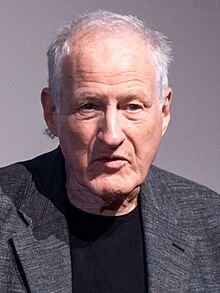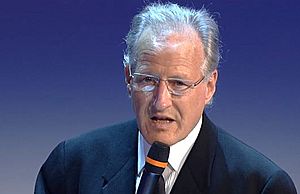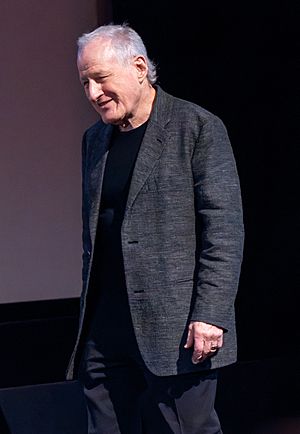Michael Mann facts for kids
Quick facts for kids
Michael Mann
|
|
|---|---|

Mann in 2023
|
|
| Born |
Michael Kenneth Mann
February 5, 1943 |
| Education | University of Wisconsin-Madison (BA) London Film School (MA) |
| Occupation |
|
| Years active | 1968–present |
| Spouse(s) |
Summer Mann
(m. 1974) |
| Children | 4, including Ami Canaan |
Michael Kenneth Mann (born February 5, 1943) is an American film director, screenwriter, author, and producer. He is famous for his stylish crime drama movies. He has won a BAFTA Award and two Primetime Emmy Awards. He was also nominated for four Academy Awards and two Golden Globe Awards.
Some of his well-known films include Thief (1981), Manhunter (1986), The Last of the Mohicans (1992), and Heat (1995). Other notable works are The Insider (1999), Ali (2001), Collateral (2004), Public Enemies (2009), and Ferrari (2023). He was also an executive producer for the popular TV show Miami Vice (1984–1990). He later turned Miami Vice into a movie in 2006.
Contents
Early Life and Education
Michael Mann was born on February 5, 1943, in Chicago, Illinois. His family has roots in the Russian Empire. His grandfather came to the U.S. in 1912.
Mann went to Amundsen High School. He then studied English literature at the University of Wisconsin–Madison. While in college, he watched Stanley Kubrick's movie Dr. Strangelove. This film made him fall in love with filmmaking. He said it showed him that he could make serious movies that many people would still want to see.
He earned his bachelor's degree from the University of Wisconsin in 1965. In 1967, he received a master's degree from the London Film School.
Michael Mann's Career Journey
Early Career: 1967–1978
After college, Mann moved to London in the mid-1960s. He studied cinema there and got his graduate degree in 1967. He spent seven years in the United Kingdom. During this time, he worked on commercials. He was with other famous directors like Alan Parker and Ridley Scott.
In 1968, he filmed parts of the Paris student protests. This footage was used in a documentary called Insurrection. It aired on NBC's First Tuesday news program. He also made a short film called Jaunpuri. This film won an award at the Cannes Film Festival in 1970.
Mann returned to the United States in 1971. He directed a documentary about a road trip called 17 Days Down the Line (1972). Later, a writer named Robert Lewin helped Mann learn about TV writing. This led Mann to write for several TV shows. He wrote four episodes for Starsky and Hutch (1975–1977). He also wrote for Bronk and Gibbsville.
From 1976 to 1978, he wrote four episodes for Police Story. He also directed one episode for its spin-off, Police Woman. Police Story focused on showing the real lives of police officers. This taught Mann how important it was to do good research for his work. He also created and wrote the first episode for the TV series Vega$ (1978–1981).
Breakthrough and Acclaim: 1978–1999
Mann's first feature film was Swan Song in 1978. His second film, The Jericho Mile, was made for TV in the U.S. but shown in theaters in Europe. This movie was filmed inside Folsom State Penitentiary. It won an Emmy Award in 1979 for its writing.
Mann's first movie released in cinemas as a director was Thief (1981). It starred James Caan. The film showed a realistic look at thieves in New York City and Chicago. Mann even used real former burglars to make the scenes feel very true to life. His next film was The Keep (1983). This was a supernatural thriller set during World War II in Romania. Even though it didn't do well at first, it later became a cult classic.
In the mid-1980s, Mann was an executive producer for TV shows. These included Miami Vice (1984–1990) and Crime Story (1986–1988). He helped guide these shows through his production company.
In 1986, Mann was the first to bring the character Hannibal Lecter to the big screen. This was in his movie Manhunter. It was based on the book Red Dragon. The actor Brian Cox played Hannibal.
In 1989, he wrote, produced, and directed the TV movie L.A. Takedown. He also wrote and produced the miniseries Drug Wars: The Camarena Story (1990).
Mann became widely known in 1992 for his film The Last of the Mohicans. This was an epic historical drama based on a famous novel. It starred Daniel Day-Lewis and was set during the French and Indian War. Critics praised Mann's directing style. They noted his skill with action and emotional depth.
He followed this with the crime drama Heat (1995). This movie starred Al Pacino, Robert De Niro, and Val Kilmer. It was a remake of his TV movie L.A. Takedown. The film was a big success with critics. Many called it a very well-made and engaging movie.
In 1999, Mann directed The Insider. This film was about a real-life story involving a whistleblower in the tobacco industry. Russell Crowe played the whistleblower, and Al Pacino played a journalist. The movie showed Mann's unique filmmaking style. It also received many awards and nominations, including an Academy Award nomination for Mann's direction.
Recent Works: 2001–Present
For his film Ali (2001), starring Will Smith, Mann began using digital cameras. In his action thriller Collateral, he used digital cameras for outdoor night scenes. This helped him capture more detail. Tom Cruise played a hitman in this movie, which was a different kind of role for him. Jamie Foxx was nominated for an Academy Award for his acting in Collateral.
In 2004, Mann produced Martin Scorsese's film The Aviator. This movie was about the life of Howard Hughes. The Aviator was nominated for an Academy Award for Best Picture. After Collateral, Mann directed the movie version of Miami Vice (2006).
Mann also directed commercials for companies like Mercedes-Benz and Nike. In 2008, he directed a video for Ferrari's California sports car.
Mann was a producer for the films The Kingdom and Hancock. Hancock starred Will Smith as a superhero. In 2009, Mann wrote and directed Public Enemies. This movie was about famous criminals during the Depression era. It starred Johnny Depp as John Dillinger and Christian Bale as FBI agent Melvin Purvis.
In 2010, Mann was an executive producer for the TV series Luck for HBO. He also directed the first episode. The series was later canceled.
In 2013, Mann started filming the action thriller Blackhat. It starred Chris Hemsworth as a hacker. The movie was released in 2015.
Mann directed the first episode of the 2022 crime series Tokyo Vice for HBO Max. This was his first directing work since Blackhat. In August 2022, Mann released Heat 2. This was a novel he wrote with Meg Gardiner. The book tells stories that happen before and after his 1995 film Heat. In the same month, Mann began filming Ferrari in Modena. This film starred Adam Driver and Penélope Cruz. Ferrari was shown at the 80th Venice International Film Festival and released in the U.S. in December 2023. The movie received good reviews.
Directing Style
Michael Mann's films often feature brightly lit nighttime scenes. They also have unique music scores. For example, Thief used music from Tangerine Dream. Manhunter featured new-age music.
Dante Spinotti is a cinematographer who often works on Mann's films. Critics describe Mann's work as very energetic and precise. They also note that his films have many layers of psychology.
Mann is known for telling stories about criminals and the police who try to catch them. His films often show that criminals and police officers, at the top of their fields, can be quite similar. They both live by their own rules and often understand each other.
Mann's films are also known for their realistic gun sounds. He prefers to use the actual sounds recorded during filming. His movies often use practical effects for action scenes. Actors attend special training to learn how to handle weapons. They use special blanks in scenes to make the gun sounds very real.
Personal Life
Michael Mann's daughter, Ami Canaan Mann, is also a film director and producer.
Filmography
Michael Mann has directed 12 movies for cinemas. His full list of works includes many other projects.
| Year | Title | Distributor |
|---|---|---|
| 1981 | Thief | United Artists |
| 1983 | The Keep | Paramount Pictures |
| 1986 | Manhunter | De Laurentiis Entertainment Group |
| 1992 | The Last of the Mohicans | 20th Century Fox / Warner Bros. |
| 1995 | Heat | Warner Bros. |
| 1999 | The Insider | Buena Vista Pictures |
| 2001 | Ali | Sony Pictures Releasing / Initial Entertainment Group |
| 2004 | Collateral | DreamWorks Pictures / Paramount Pictures |
| 2006 | Miami Vice | Universal Pictures |
| 2009 | Public Enemies | |
| 2015 | Blackhat | |
| 2023 | Ferrari | STX Entertainment / Neon |
Awards and Nominations
Michael Mann has received many awards and nominations for his work. These include honors from the British Academy of Film and Television Arts, Cannes, and the Academy of Motion Picture Arts and Sciences. As a producer, he was nominated twice for the Academy Award for Best Picture. These nominations were for The Insider and The Aviator (2004).
Total Film magazine ranked Mann as No. 28 on its 2007 list of the 100 Greatest Directors Ever. Sight and Sound magazine placed him at No. 5 on their list of the 10 Best Directors of the Last 25 Years (from 1977–2002).
| Year | Title | Academy Awards | BAFTA Awards | Golden Globe Awards | |||
|---|---|---|---|---|---|---|---|
| Nominations | Wins | Nominations | Wins | Nominations | Wins | ||
| 1992 | The Last of the Mohicans | 1 | 1 | 7 | 2 | 1 | |
| 1999 | The Insider | 7 | 1 | 5 | |||
| 2001 | Ali | 2 | 2 | 1 | 3 | ||
| 2004 | Collateral | 2 | 5 | 1 | 1 | ||
| 2023 | Ferrari | 1 | |||||
| Total | 12 | 1 | 16 | 4 | 10 | 0 | |
Academy Award Nominations for Actors in Mann's Films
Actors who worked with Michael Mann have received Academy Award nominations for their roles.
| Year | Performer | Film | Result |
|---|---|---|---|
| Academy Award for Best Actor | |||
| 2000 | Russell Crowe | The Insider | Nominated |
| 2002 | Will Smith | Ali | Nominated |
| Academy Award for Best Supporting Actor | |||
| 2002 | Jon Voight | Ali | Nominated |
| 2005 | Jamie Foxx | Collateral | Nominated |
See also
 In Spanish: Michael Mann para niños
In Spanish: Michael Mann para niños



